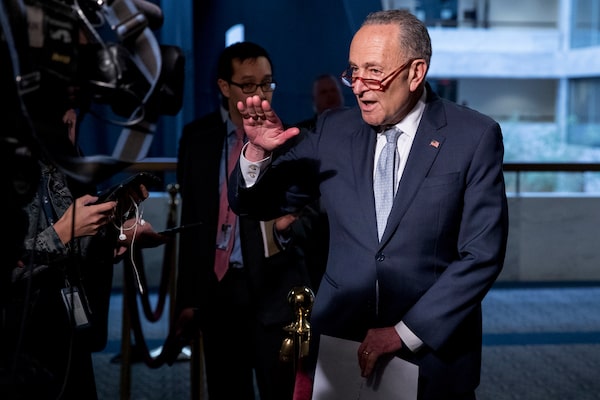
Senate Minority Leader Sen. Chuck Schumer of N.Y., speaks to reporters as he arrives for a meeting to discuss the coronavirus relief bill on Capitol Hill Washington on March 20, 2020.Andrew Harnik/The Associated Press
U.S. lawmakers are near agreement on approving extra money to help small businesses hurt by the coronavirus pandemic and could seal a deal as early as Sunday, congressional and Trump administration officials said.
“I think we’re very close to a deal today and I’m hopeful we can get that done,” Treasury Secretary Steven Mnuchin told CNN.
Senate Democratic leader Chuck Schumer also said he hoped an agreement with Republicans could be reached as early as Sunday evening. Schumer cautioned, however, that both sides had a few more issues to deal with.
An agreement would end a stalemate over Republican President Donald Trump’s request to add US$250 billion to a small-business loan program. Congress established the program last month as part of a US$2.3 trillion coronavirus economic relief plan, but it has already run out of money.
Senate Republicans and Mnuchin had a conference call on Sunday afternoon, said a senior Republican aide, who said Trump also joined the call.
Democratic leaders want more money for small businesses but with additional safeguards to ensure that credit is reaching businesses in underserved communities. They also sought more funds for state and local governments and hospitals, as well as food aid for the poor.
Republican Senate Majority Leader Mitch McConnell and Mnuchin told senators on the call that additional funding that Democrats had sought for state and local governments or food stamps would not be in the package
“The president has heard from governors and he’s prepared to discuss that in the next bill,” Mnuchin told CNN. Congress plans to take up another major coronavirus relief measure after the small-business fund is replenished.
Separately, Democratic Senator Bob Menendez and Republican Bill Cassidy said on Sunday they would formally introduce legislation when the Senate reconvenes to create a US$500 billion fund to help state and local governments respond to the crisis.
GOVERNORS SPARRING WITH TRUMP
The United States has by far the world’s largest number of confirmed coronavirus cases, with more than 740,000 infections and over 40,000 deaths. State governors are sparring with Trump, who wants them to reopen their economies.
Governors of hard-hit states such as New York and New Jersey have said they need more federal funding for increased testing and to cope with the pandemic’s effect on their budgets.
If the U.S. government wants to reopen and rebuild the economy, it must support states, said Massachusetts Governor Charlie Baker, a Republican.
“If we’re going to be laying off tens of thousands of people at the time where they want to reopen the economy, we’re going to be swimming against the current they’re trying to create,” Baker said on CBS’ “Face the Nation.”
New York Governor Andrew Cuomo said his state faced a budget deficit of up to US$15 billion, which could spell cuts in funding for schools and hospitals.
“You have the president saying 15 times, it’s up to the governors, it’s up to the governors, it’s up to the governors. And then they’re going to pass a piece of legislation that gives you know what to states? Zero,” Cuomo, a Democrat, said at his daily coronavirus briefing.
Mnuchin said the deal would include a further US$300 billion for the Paycheck Protection Program loan program for small businesses, after the initial US$350 billion was exhausted on Thursday, less than two weeks after the scheme launched.
He said there would be US$75 billion allocated to hospitals and a US$25 billion federal program “that can be used with the states with new technology to invest in testing.”
About US$50 billion would be added to the Small Business Administration (SBA) disaster loan fund, another program to help small businesses, Mnuchin said.
Nancy Pelosi, speaker of the Democratic-controlled House of Representatives, also said a deal was very close.
Pelosi told ABC’s “This Week” she wanted additional funds in the package to help police and fire departments, teachers, health care workers and hospitals. Democrats also wanted to ensure the money was reaching “all of America’s small businesses.”
More than 25 per cent of the US$350 billion already allocated went to fewer than 2 per cent of the firms that got relief, and they included a number of publicly traded companies with thousands of employees, highly paid executives and hundreds of millions of dollars in annual sales.
Sign up for the Coronavirus Update newsletter to read the day’s essential coronavirus news, features and explainers written by Globe reporters and editors.